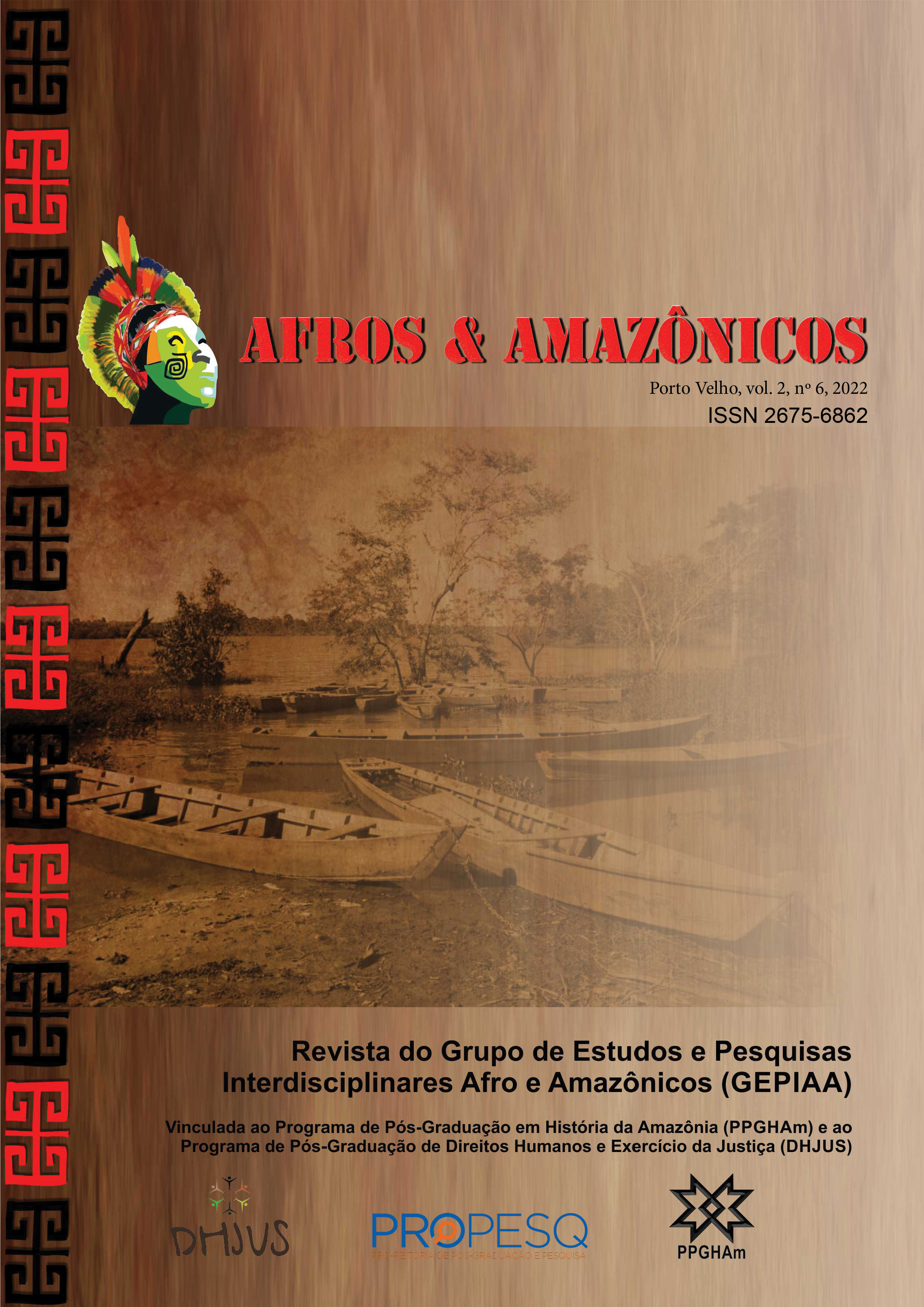The Ancient Ones Who Say
Ancestral Pedagogy of Black Quilombola Women
Keywords:
Quilombola Pedagogy, Ancestry, Female power, EducationAbstract
This research addresses the political organization of Black Women from the Quilombola Territory of the Jambuaçu-Moju/PA and the affirmation of female power in this Territory, whose centrality is in the educational dimension evidenced in the process of returning to the forms of organization and ancestral struggles of such women. The main objective of this investigation is to identify and understand the strategies developed by Black Quilombola Women to establish Female Power in the communities in which they are inserted. In order to do so, the factors identified as determinants for the awareness of the racial and gender profile, in the personal and political trajectory of these women, as well as the educational processes – trainers – and the knowledge built in them, were analyzed. Such knowledge is understood, in this work, as transgressive ancestral pedagogies learned, formulated and used by Black Quilombola Women in the social and political contexts through which they passed. In a process of tension, advances and struggles, the black women interviewed assumed an important political role within the movement for the defense and maintenance of the Territory in the face of the advance of agromineral capital in the region. Escrevivencia was the methodology used to embody the other narratives produced by the subjects who dialogically teach through other pedagogies, that of the challenges experienced by such women in the political and personal treatment of the difference between the different, within the Social Movements of an indemnity nature. It is in this complex process that they build and rebuild their pedagogies.
Downloads
References
ARROYO, Miguel G. Currículo, território em disputa. 2. ed. Petrópolis: Vozes, 2014.
BARRETTO, Raquel. Introdução: Lélia Gonzalez, uma interprete do Brasil. In: GONZALES, Lélia. Primavera para as rosas negras: Lélia em primeira pessoa. São Paulo: Diáspora Africana., 2018.
CARTOGRAFIA SOCIAL DA AMAZÔNIA. Quilombolas de Jambuaçu – Moju – Pará. Brasília: Fascículo 3, 2007.
CUNHA JUNIOR, Henrique. Quilombo: patrimônio histórico e cultural. Revista Espaço Acadêmico. Maringá, ano 11, n. 129, p. 158-167, fev., 2012.
EVARISTO, Conceição. Literatura negra: uma voz quilombola na literatura brasileira. In: PEREIRA, Edimilson de A. (org.). Um tigre na floresta de signos: estudos sobre poesia e demandas sociais no Brasil. Belo Horizonte: Mazza Edições, 2010. p. 132-142.
GONZALES, Lélia. Racismo e sexismo na cultura brasileira. Revista Ciências Sociais Hoje (ANPOCS). [S. l.], p. 223-244, 1984.
LIMA FILHO, Petrônio M.; CARDOSO, Luís Fernando C. e; ALENCAR, Edna. Festas de santo, território e alianças políticas entre comunidades quilombolas de Salvaterra, Marajó, Pará, Brasil. Bol. Mus. Para. Emílio Goeldi. Cienc. Hum. Belém, v. 13, n. 1, p. 109-128, jan./abr., 2018.
MIGNOLO, Walter D. Desobediência Epistêmica: a opção descolonial e o significado de identidade em política. Cadernos de Letras da UFF – Dossiê: Literatura, língua e identidade. Niterói, n. 34, p. 287-324, 2008.
MOREIRA, Eliane; e MIRANDA, João Paulo Rocha de. O direito à participação de grupos vulneráveis: povos indígenas e comunidades tradicionais. In: DINNEBIER, Flávia França (Org.); MORATO, José Rubens (Org.). Estado de Direito Ecológico: Conceito, Conteúdo e Novas Dimensões para a Proteção da Natureza. – São Paulo: Inst. O direito por um Planeta Verde, 2017.
OYĚWÙMÍ, Oyèrónké. Conceituando o gênero: os fundamentos eurocêntricos dos conceitos feministas e o desafio das epistemologias africanas. Tradução para uso didático de: OYĚWÙMÍ, Oyèrónké. Conceptualizing Gender: the Eurocentric foundations of feminist concepts and the challenge of African epistemologies. African Gender Scholarship: Concepts, Methodologies and Paradigms. CODESRIA Gender Series. Volume 1, Dakar, CODESRIA, 2004, p. 1-8, por Juliana Araújo Lopes. Disponível em: https://ayalaboratorio.files.wordpress.com. Acesso em: jan. 2019.
PALHA, Bárbara da Fonseca. História de Trabalhadoras Escravas de Belém do Século XIX. Anais do XXVI Simpósio Nacional de História – ANPUH, São Paulo, 2011.
PARÁ. Protocolo de Consulta Previa, Livre e Informada dos Quilombolas do Jambuaçu-Moju/PA, 2018 –PDF , Acessado em 19 de dezembro de 2019. Disponível no endereço eletrônico https://www2.mppa.mp.br.
PORTO-GONÇALVES, Carlos Walter. Amazônia, Amazônias. 1. ed. São Paulo: Contexto, 2001.
QUIJANO, Aníbal. Colonialidade do poder, eurocentrismo e América Latina. In: LANDER, E. (Org.). A colonialidade do saber: eurocentrismo e Ciências Sociais. Buenos Aires: Consejo Latinoamericano de Ciencias Sociales (CLACSO), 2005. p. 227-278.
SALLES, Vicente. O negro na formação da sociedade paraense. 2. ed. Belém: Paka-Tatu, 2015.
SALLES, Vicente. O negro no Pará sob o regime da escravidão. 3. ed. Belém: Instituto de Artes do Pará, 2005.
SILVA, Petronilha B. Gonçalves. Dez anos de Lei 10.639/03. SP, 2013, Acessado em 15 de abril 2019. Disponível no endereço eletrônico: https://www.youtube.com.
SOARES, Lissandra V.; MACHADO, Paula S. “Escrevivencia” como ferramenta metodológica na produção de conhecimento em Psicologia Social. Psicologia Política. São Paulo, v. 17. n. 39. p. 203-219, mai./ago., 2017.
Downloads
Published
How to Cite
Issue
Section
License
Copyright (c) 2022 Joana Carmen do Nascimento Machado

This work is licensed under a Creative Commons Attribution-ShareAlike 4.0 International License.
Autores mantém os direitos autorais e concedem à revista o direito de primeira publicação, com o trabalho simultaneamente licenciado sob a Licença Creative Commons Attribution que permite o compartilhamento do trabalho com reconhecimento da autoria e publicação inicial nesta revista.



